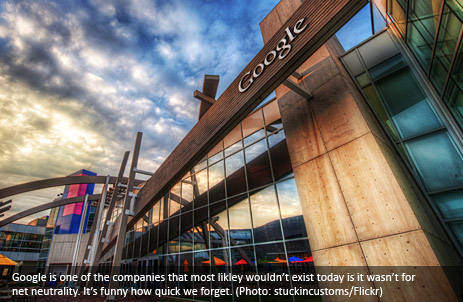
Oliver Johnson, in his article Net Neutrality – The Phony War, published in this week’s CircleID, has a deterministic view on why net neutrality is never going to be achieved. It is, he argues, just a mirage even today. Net neutrality can never be achieved, simply because it is not in the interest of the markets. The problem, he says, is that the ISPs and cable companies must generate growth. This far, growth has been maintained by selling more and more connections. However, as the number of households is finite, that growth is impossible to retain. The only route left then is segmentation. His argument is self-referring.
Stability just isn’t sexy enough. If you want your share price to increase then you have to demonstrate revenue and preferably margin growth.
For whom is the “market”?
We have to stop talking about the market as an absolute. What we call a market is not as inescapable as gravity. It is not a law of nature. Without going too much into specifics, it’s clear that a capitalist market works well – most of the time. There are however, many occasions where it doesn’t work, of perform badly. Exactly where we draw the line depends on where you are in the world: most of Europe, for example, have quite a different view than the US on basic health services. But in all societies, regardless of country, there is a line.
Politicians, step up!
It is the responsibility of the politicians to oversee the market so that society reaps the maximum amount of benefits from it. I wonder if there’s any (developed) country where fire services are privatized, just to name one? When a house is on fire, it’s an issue for the whole community – not just the owner of the house.
History shows that cable companies are not very good at creating, what Mr. Johnson calls, value-added services. In fact, to put it bluntly, they suck at it. The reason the Internet grew, and won over competing closed services (and there were many: The Microsoft Network, CompuServe, AOL to name but a few) 15 years ago was because infrastructure and content is two very, very different breeds of horses.
Focus on what you do best. If companies who build roads would start making cars, or build amusement parks where people could go using the company’s roads in the company’s cars, most would agree that it was a serious case of hubris. Even if it made their shareholders disappointed.
Freedom to invent
Mr. Johnson speaks of a market. But there are others markets. Net neutrality guarantees that there’s a market of competing services on the internet. ISPs have one job to do: deliver bits. They might not like that, but really, that’s what they’re good at. Please, keep your fingers out of the other jars!
Without free competition on the internet market – if there was no net neutrality ten years ago, none of the services we use and love today would have existed. Not Google. Not Facebook. Not Flickr. Not Twitter. Kiva? Delicious? Yahoo? No! Definitely not The Pirate Bay or Torrentreactor and thus not Spotify or Pandora! I could go on. What we would have, in that alternate reality, is News Corp, Time Warner and Disney. In this universe Barak Obama wouldn’t be president of the United States!
I’m left with the feeling that Mr. Johnson is willing to sacrifice what could be the most important infrastructural achievement since the construction of a nationwide road network, all to keep shareholders in a few major cable companies happy. That’s outrageous.
Who is Topic Point?
It seems his argument is not only self-referring but also self-serving. It might be also interesting to note the Oliver Johnson is the CEO of Point Topic, a company that makes a living giving advice to broadband carriers.
